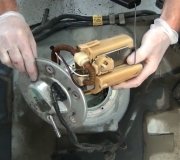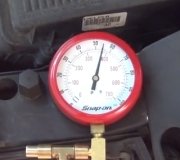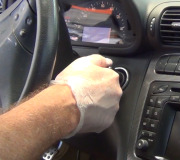This used to be a real common complaint with Chrysler products. Bought a replacement from the auto parts store, and it failed within weeks. Four or five replacements also failed repeatedly. Buy a pump from the dealer out of frustration, and have no more problems.
The issue was not the quality of the pumps. In fact, at that time NAPA was buying their Chrysler pumps from the same original supplier that supplied them to Chrysler. The problem was microscopic gunk in the tank that was plugging the pumps' impeller. Chrysler pumps are very quiet because they are built to such tight clearances, but that made them prone to this problem. By the time you got to the fifth or sixth pump, which happened to come from the dealer's parts department, all the gunk had been collected, so there were no more failures.
The proper fix is to have the tank steam-cleaned at a radiator repair shop, then install the new pump. I have also heard talk about the gunk being caused by mold feeding and growing on the ethanol in the gas. I would suspect that would affect people more who drive little enough that a tank of gas might last them few weeks, but I do not know that for a fact.
Related to this, the most common way for GM fuel pumps to fail is while you are driving, as you described, so you are stranded out on the highway. Once they cool down, they will often work again. Chrysler pumps almost always fail by failing to start up, so you are stranded in your driveway. Once they do start up, often by banging on the tank if necessary, they rarely stop running while you are driving.
Sunday, May 14th, 2017 AT 4:36 PM



